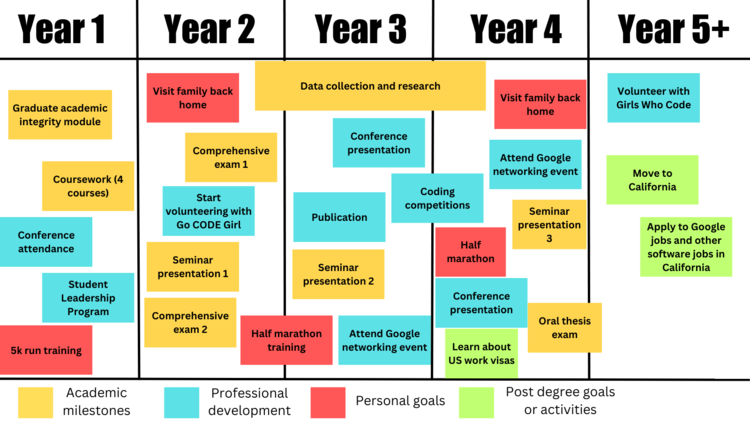
Design your time in your graduate program to meet your academic and personal goals.
Graduate studies offers more focus, increased independence, and (usually) more choices for how to design your degree compared to undergraduate studies. By taking advantage of this flexibility, you can take charge of your education by designing your degree to best fit your interests and future aspirations.
Jump to: Identifying academic milestones | Odyssey plans
Identifying academic milestones
Academic milestones are non-course degree requirements such as specific assessments or activities that you must complete as part of the requirements for your program. Some examples of academic milestones are:
- Academic Integrity Module
- Required training (e.g. WHMIS)
- Internship
- Research proposal
- Data collection / research
- Comprehensive exams (for PhD students)
- Thesis
- Oral thesis defence
Academic milestones and degree requirements are different for each graduate program. You can confirm your degree requirements in the Graduate Studies Academic Calendar and monitor your milestone progress in Quest.
Odyssey plans
You can plan your degree with Odyssey plans, which help map out possible future paths and canserve as both a decision-making and planning tool.
What is an Odysssey plan?
An Odyssey plan for your degree involves establishing a timeline of the length of your program, which you then populate with important tasks and goals to create a calendar of important actions. In addition to degree-based tasks or goals, you can also include additional personal important tasks and goals (e.g., moving to a new city, participating in a marathon, etc.).

What does the Odyssey plan tell me?
Odyssey plans are unique in that you make the plan three times, creating three "alternate futures." These are different versions of the same timeline, featuring different tasks and goals.
For example, perhaps you've considered starting your own company, moving internationally after graduation, or working for the government. By using Odyssey plans, you can think about how you would design your time at Waterloo differently, depending on your goals. It's likely that many of your degree-related tasks will remain the same, but what may change between the plans is the timing of degree requirements and your extra curriculars.
Once you have drafted these "alternate futures," the next step of the Odyssey planning process is to take time to reflect on your thoughts and feelings about each of them. You can ask questions like:
- How realistic is this plan?
- How confident am I in my ability to follow it?
- How does it make me feel?
Asking these and similar questions can help you evaluate your options and ultimately decide on the best path forward.
Why use an Odyssey plan?
By considering multiple viable alternatives, you can avoid tunnel vision and prevent yourself from fixating on the myth of a single "correct" path to take. Things might also change! This kind of planning can help you be open to opportunities while creating structure and intentionality.